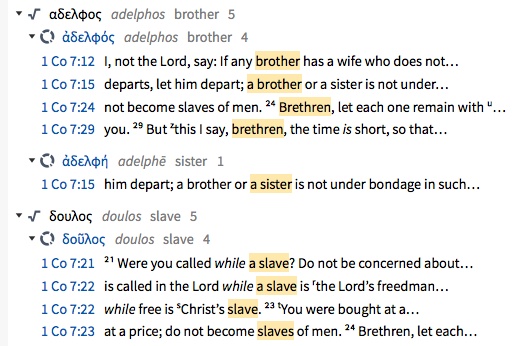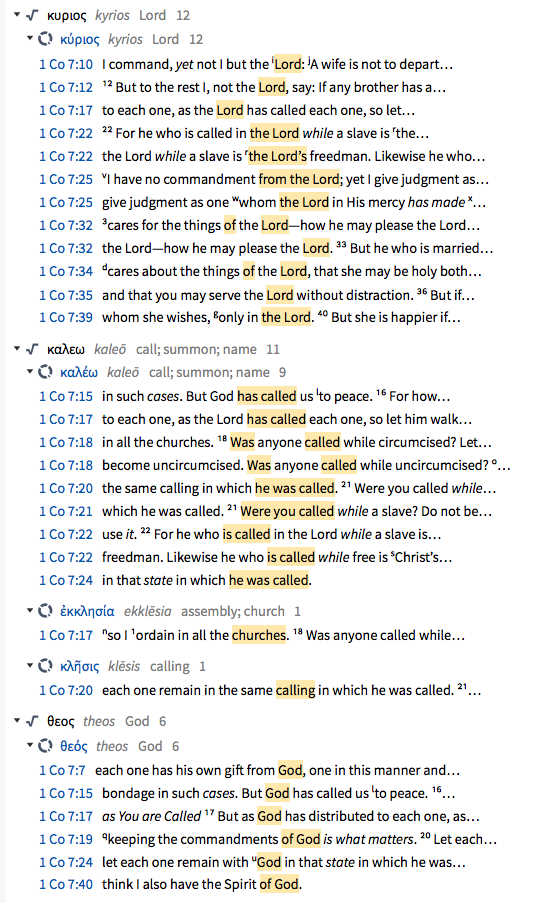Wed. Nov 8, 2017, Original Posting.
Updated: 10/10/17 with Para. 5 and following.
Updated 11/11/17 with certain additions to Para. 6, and Paras. 7 and 8.
Updated 11/13/17 providing the Pericope of Para. 9 and on Love in Para. 10.
Updated 11/14/17 with additional sub paragraphs in Para. 10 on “love,” and some ‘cleanup’ of typos etc. throughout.
Note: when printing all these 1 Cor 7 resources on this long webpage, click on the “page headers” option on your printer screen to provide page numbers and print date. You can also print it to a PDF format and then use the Adobe application on your computer to print it out in paper form, which two step process should also show page numbers.
Further Note: when you do the above print out, you will NOT get the texts that are available by the links shown by the blue-font text such as the end phrase of Para. 1 below, and so forth. You have to separately click on each such linked text (and in some cases, click a second time) to be able to see such material and then print those out one by each. The blue text shown in the various pasted-in tables, such as Para. 2.A is not a linked text here, so clicking there gets you nowhere (they were such links in the original from which they came, but it does not carry over here).
Study helps for 1 Cor. Ch 7 are below:
- The Bible text for 1 Cor. 7 for the NKJV with the “root” Gr word and Strongs number is given here: 1 Cor 7 NKJV with Root, Strongs
- The Word frequencies in 1 Cor. 7 are very interesting in this chapter and are shown below by category:
- One of the most important words in the NT, and regarding our lives here in Space-Time, is one particular Gr word for “world,” namely kosmos. We get many English words from kosmos such as Cosmonaut (Russian astronaut), The Cosmos (the universe), and even cosmetics (to make beauty, order). There is a lot of amazing insights contained with the word. Here is a wonderful resource in PDF printable form of the NT usage of the word: Bible Word Study | κόσμος, kosmos
- kosmos occurs very frequently in the Corinthian Epistles, 14x in the six chapters preceding Ch 7, 4x in Ch 7, 3x subsequent times in 1 Cor. and 3x again in 2 Cor. as shown below:
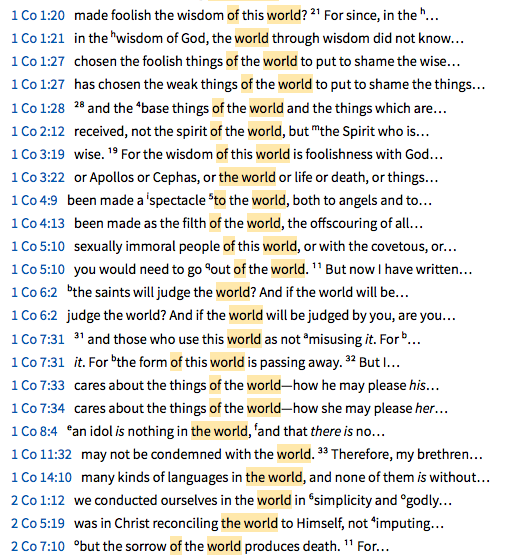
- Notice how God characterizes the kosmos: foolish, weak, and base. And the world thinks of itself as the opposite of such characterization and, ironically, considers the followers of Christ to be foolish, weak, and base!
- But any unvarnished observation of our world system (which is the root idea of the kosmos) sees that its foundation is built on sand, sin, and self-aggrandizement. Despite the astonishing technological and scientific and even artistic accomplishments (after all there was Mozart and Michelangelo) there is an utter ‘lostness’ to our system-without-God. Looking only at wars and famine, and only at the 20th Century, the evidence for utter despair is clearly there, but, yet, the kosmos spins on each day promising new little gaggles and new, but false, hope. Here is some kosmos reality of the previous Century, where I spent a lot of time, and my mother lived (almost) end-to-end, from www.quora.com (direct quotes below):
-
According to Matthew White’s estimate on the page Worldwide Statistics of Casualties, Massacres, Disasters and Atrocities., a total of about 123 million people died in all wars of the 20th Century, thereof 37 million military deaths, 27 million collateral civilian deaths, 41 million victims of “democide” (genocide and other mass murder) and 18 million victims of non-democidal famine.
-
White also presents the following other estimates:
- 87,500,000 war dead according to Zbigniew Brzezinski in 1993, thereof 33,500,000 military war dead and 54,000,000 civilian war dead.
- 130–142 million military and civilian deaths in war and conflicts, according to Milton Leitenberg.
-
- Famine in large part, almost entirely, is likewise attributable to “the kosmos.” Below is another quotation from “Famine in the 20th Century’ by Stephen Devereux. IDS Working Paper 105 (the exactitude of all these horrific data is not material to showing the point):
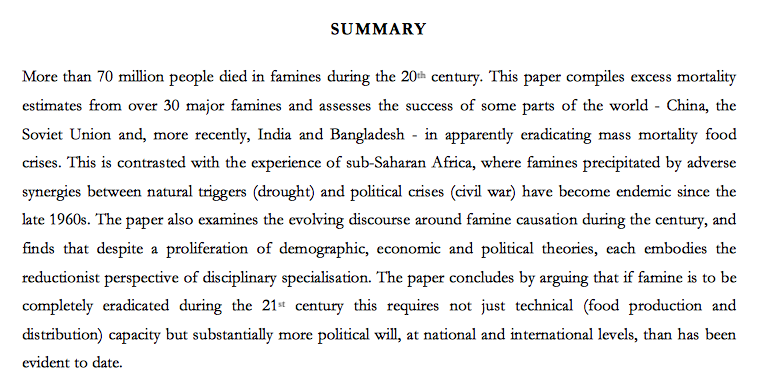
- kosmos occurs very frequently in the Corinthian Epistles, 14x in the six chapters preceding Ch 7, 4x in Ch 7, 3x subsequent times in 1 Cor. and 3x again in 2 Cor. as shown below:
- There are (at least) three related Gr words to kosmos: earth, age (aion), and kingdom. The word for earth has the Gr letters “geo” which forms the basis of English words geology, geography, and even George. The Gr word for age clearly relates to the English word eon. So earth is about the physical place we live, age is about the era in which we live, and kingdom is about the rulership / control of the people and the earth and to some extent the age as well.
- Dr. Albert Mohler has a wonderful talk on “kingdom” in his series on ‘The Lord’s Prayer.” It can be heard here.
- Dr. Mohler’s subsequent talk on “The Lord’s Prayer” is also relevant to “kingdom” and can be heard here.
- These two talks highlight the polar opposite ‘worlds’ of (in Augustine’s terminology) of “The City of this World” with “The City of God.” Tying this back to our word kosmos, we see that it describes our Space-Time organized system which is, in other terms, “The City of this World.”
- For those who would enjoy a little levity associated with a metaphor of the way this world thinks and organizes, there is a YouTube video of some college men in Brazil who thought they came up with a grand plan of how to get a large, heavy dresser down from the second floor to the first floor of a dormitory by carefully letting it plop onto multiple mattresses on the ground floor below. The result is pretty hilarious. But when our kosmos tries to manage life without God the results are metaphorically similar but not humorous.
- Some further thoughts about our kosmos and its work to control our thought:
- Happiness. It’s thought to be the universal answer to what motivates humans, and its pursuit is one of the self-evident truths of the Declaration of Independence at the foundation of the United States: , “We hold these Truths to be self-evident, that all Men are created equal, that they are endowed by their Creator with certain unalienable Rights, that among these are Life, Liberty, and the Pursuit of Happiness….” In ancient, secular Gr thought there was a parallel and important idea expressed by Gr eudaemonia.
- Here is Wikipedia summarizing what eudaemonia means (emphasis mine): “Eudaimonia (Greek: εὐδαιμονία [eu̯dai̯mo’níaː]), sometimes anglicized as eudaemonia or eudemonia /juːdɪˈmoʊniə/, is a Greek word commonly translated as happiness or welfare; however, “human flourishing” has been proposed as a more accurate translation. Etymologically, it consists of the words “eu” (“good”) and “daimōn” (“spirit”). It is a central concept in Aristotelian ethics and political philosophy, along with the terms “aretē”, most often translated as “virtue” or “excellence”, and “phronesis”, often translated as “practical or ethical wisdom”. In Aristotle’s works, eudaimonia was (based on older Greek tradition) used as the term for the highest human good, and so it is the aim of practical philosophy, including ethics and political philosophy, to consider (and also experience) what it really is, and how it can be achieved.”
- The cover story on a recent issue of National Geographic is on “happiness,” and in particular which countries in the world are “the happiest” (they concluded: Costa Rica, Denmark, and Singapore). Given the increasingly socialist leanings of National Geographic their observation of “happiness” is colored by where the respective governments take best care of its citizens, like an earthly father. Here’s the cover of that issue:

- We live in an age of cunning attacks on our consciousness and thereby our values, priorities. One of the most prevalent of these if Facebook, which now has more than two billion (2 BILLION!) “members,” more than one billion of which check in and do something on their pages every day (actually 1.37 billion “Daily Active Users,” DAU, Q2, 2017). There only about 7 billion living humans; think about what it means that 1.4 billion of them check in every day on Facebook. Why, oh why, are they doing so? Here is a recent commentary by one of the co-founders of Facebook, who became a multii-billionaire (!) from such work. Sean Parker unloads on Facebook exploiting human weakness. There are now research studies that are showing destructive effects of FB and such social media upon especially teens, and especially girls. There are two recent books both having the word “disconnected” in their titles that appear to be reliable, authoritative discussions of the serious, present dangers: here and here (the latter is a well-recognized Christian author).
- Happiness. It’s thought to be the universal answer to what motivates humans, and its pursuit is one of the self-evident truths of the Declaration of Independence at the foundation of the United States: , “We hold these Truths to be self-evident, that all Men are created equal, that they are endowed by their Creator with certain unalienable Rights, that among these are Life, Liberty, and the Pursuit of Happiness….” In ancient, secular Gr thought there was a parallel and important idea expressed by Gr eudaemonia.
- Seemingly the opposite subject from “happiness” is being confronted with commands of us. But is it? An examination of imperative verbs in 1 Cor 7 leads to a very surprising result: first, there are 22 of them!
- Here’s the complete list directly below. It is helpful to print this list and use the texts in the NKJV PDF in Para. 1 or your favorite Bible to underline or double underline these verbs as reminders and tools for observation that these are (1) verbs, meaning actually doing something, and, more importantly, (2) they are commands of God.

- What is it about imperative verbs? They are about what we are to do, being disciples of Jesus Christ. Consider these verses:
John 14:23
Jesus answered and said to him, “If anyone loves Me, he will keep My word; and My Father will love him, and We will come to him and make Our abode with him.
John 8:31
So Jesus was saying to those Jews who had believed Him, “If you continue in My word, then you are truly disciples of Mine;
John 14:21
“He who has My commandments and keeps them is the one who loves Me; and he who loves Me will be loved by My Father, and I will love him and will disclose Myself to him.”
John 14:23-24
Jesus answered and said to him, “If anyone loves Me, he will keep My word; and My Father will love him, and We will come to him and make Our abode with him. “He who does not love Me does not keep My words; and the word which you hear is not Mine, but the Father’s who sent Me.
John 14:15
“If you love Me, you will keep My commandments.
John 15:10-15
“If you keep My commandments, you will abide in My love; just as I have kept My Father’s commandments and abide in His love. “These things I have spoken to you so that My joy may be in you, and that your joy may be made full. “This is My commandment, that you love one another, just as I have loved you. read more.
1 John 2:3
By this we know that we have come to know Him, if we keep His commandments.
1 John 3:22
and whatever we ask we receive from Him, because we keep His commandments and do the things that are pleasing in His sight.
1 John 3:24
The one who keeps His commandments abides in Him, and He in him We know by this that He abides in us, by the Spirit whom He has given us.
1 John 5:3
For this is the love of God, that we keep His commandments; and His commandments are not burdensome. - John Piper adds this to the subject of what it means to be a disciple of Jesus.
- Now the essential question: is (at least some) “happiness” lost by obeying God? The prevailing view of our kosmos is that the answer must be an emphatic “yes,” because if God is God then we are not God and so we do not get to do what we want, to rule our own lives as a self-sovereign, so that it is self-evident that we will be less happy. But is the kosmos correct? Here’s John Piper gives his answer to exactly this question in his book Don’t Waste Your Life. The book is widely available for sale but Piper has also made it freely available as a PDF. It is attached here; caution: don’t just print the PDF as it is a long document. Don’t Waste Your Life
- As noted above, there are 22 imperative verbs in just Ch 7 alone. Here is the ‘scorecard’ of imperative verbs for each of the first six chapters in 1 Cor: 1, 0, 4, 3, 1, 3. So the total number of imperative verbs in the first six chapters of 1 Cor was 12, and in Ch 7 alone there are 22 verbs. (It should be noted that imperative verbs are not the most common form: in 1 Cor Ch 1-6 there were a total of 120 verbs, so the 12 imperatives represent one out of 10 verbs. In Ch 7 there are 44 verbs, so the 22 imperatives are 1 out of 2 verbs, a dramatic difference, and tells us that Ch 7 is getting down to the nitty gritty of an issue (marriage / divorce / sex) that the Corinthian believers were either lax or rebellious (or both)
- Not all imperative verbs are the same. The imperative verbs shown above of of two types: present imperatives and aorist imperatives, where the modifying adjective of “imperatives” is the “tense” of the verb. Nineteen of the above 22 shown imperative verbs are in the present tense, which is the normal sense of an imperative verb meaning the obvious, this is something to do now, in the present. However, there is another important tense of imperatives and that is the aorist. With ordinary verbs, namely those not in the imperative verb, the aorist tense signifies a once-in-the-past action, sometimes characterized was done once-for-all with forever (enduring) consequences, with the idea that one did or has done something once with a forever permanent consequence. With the imperative mood, such ordinary interpretation the aorist does not seem to fit and the prevailing Gr grammars say that aorist imperatives have no time dimension but only refer to some aspect of the ‘wholeness’ of the act. I think they’re wrong on this–and so I am probably wrong, but I think what I think, and here’s what it is: aorist imperatives are present commands of action calling back to a realization of a prior commitment. So, if one joined the military and then joined and became a special forces SEAL, then ever after one needs to call to mind in every present imperative situation one’s prior once-for-all commitment to such cause. In 1 Cor 7 we are not concerned about SEALS but another kind of special forces situation, namely, marriage, and the related idea of virginity. Pasted in below are the three aorist imperative verbs in 1 Cor 7 (all the other imperative verbs listed above are present imperatives); see if this understanding of aorist imperatives makes sense:
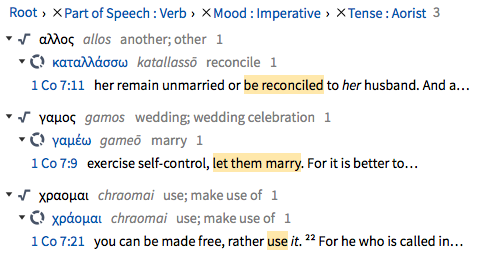
- Here’s the complete list directly below. It is helpful to print this list and use the texts in the NKJV PDF in Para. 1 or your favorite Bible to underline or double underline these verbs as reminders and tools for observation that these are (1) verbs, meaning actually doing something, and, more importantly, (2) they are commands of God.
- A great, but serious, tool for ‘deep dive’ study of the Scriptures is known as “Clausal Analysis,” that is examining the text by a “Clausal Outline.” When we communicate we normally do so by means of phrases (clauses), sometimes many of them in one whole thought, that interconnect in all manner of complex ways. This is especially the case when dealing with complex subjects.
- As a consequence it becomes easy to ‘get lost’ in the language, especially in our day and age with brains ruined, or nearly so, by TV, the internet, social media, and the rock / bop barrage of what goes for “music.” When we are face-to-face with someone, all the related forms of communication–gestures, voice dynamics, and so forth–help us keep on track with what’s being said. With texts, it is more difficult.
- A further challenge occurs when the text we are seeking to understand was originally written in another language, especially a highly-inflected language like Gr. Translators do the best they can but are endlessly confronted with making both word choices and phrasing choices all while keeping in mind the crippled reading level of the target audience (which, these days, is pre- or early- high school level readers). Think about what it means to be confined to reading texts that can be no more sophisticated in expression than what can be readily grasped by an 8th grader, especially an 8th grader educated in and by our present kosmos.
- So, that leads to the value of using other language tools such as we have been trying to do here. Among such tools, which we have not yet used, is Clausal Outlines.
- Here is an introduction from that resource about why such was created and generally how it is to be used: The Lexham Clausal Outlines of the Greek New Testament.
- Directly below is such an Outline for 1 Cor 7. Try reading through it to see if it helps making the reasoning / communication clearer. Caution: reading this Outline demands more of us than just a cursory five minute scan. The Lexham Clausal Outlines of the Greek New Testament
- In the Outlines document above you will note letters in all caps above the words of the Bible text. These are keys to the “morphology” of the word. (Morphology is a linguistic term that simply means the form of the word: as the verb “to run,” or just “run,” has different forms such as “ran” and “runs” which tell us some important things about how we should understand “run” in that particular context).
- The meaning of the morphology codes is given here: Greek Morphology Codes. An abbreviated version of these codes is here: Logos Morph Chart Summary
- Here’s how such codes can be used. Look in the above Outline for codes that begin with the letter “V” and have an “M” in the 4th position, namely: VxxMxx. The “V” designates a verb, and the “M” that it is in the imperative “mood,” namely a command. Next, look in the second position to find either VPxMxx or VAxMxx; the former is for imperative verbs in the “present” tense and the latter in the “aorist” tense as discussed above. Finally, the third position will have either an “A” for “active” “voice” meaning the subject of the sentence is doing the action or, for imperative verbs, a “U” meaning that the morphology of the verb is undefined as to whether it is in the “active” voice or “passive” or “middle” voices. The last two positions in the morphology codes for verbs is for the “person” (1st, 2nd, or 3rd, meaning “me,” “you,” or “they/them”) and “number” (P for plural, S for singular).
- Applying such codes, for example, we see in 1 Cor 7:2-3 there are three verbs that are “VPAMxx” meaning that they are Present, Active, Imperative verbs, which tells us that the subject of the sentence is commanded by the verb in the ‘now’ (present) sense of doing something.
- Another interesting verb morphology is given by VRPIxx. Here the “R” designates the “perfect tense, the “P” the passive voice, and “I” the indicative “mood.” Look at 1 Cor 7:14 for such an example relating to the verb “to sanctify” as the believing wife somehow does for the unbelieving husband. The indicative mood is the simple fact stating designation, telling us this is ‘how it is.’ The passive voice tells us that it is the husband who receives the action of “sanctification” (because of his marriage to the believing wife). The “perfect” tense designates a past action with continuing consequence as opposed to pointing to a past action only (which would be the “aorist” tense) or to a continually occurring condition (which would be an “imperfect” tense). (Note: the use of “perfect” and “imperfect” has noting to do with the ordinary sense of goodness or completeness). So, VRPIxx is telling us that there is an ongoing sanctification that flows to the husband because of a past action (marriage), and that’s a fact..
- There are three references to the conditions of the then particular time that impact our interpretation of the respective verses:
- 1 Cor 7:26 speaks of “the impending distress”
- 7:29 gives as a context that the [present] “time is shortened”
- 7:32 the passing away of “the present form”
- If we put ourselves back at the time of the writing and receipt of the 1st Corinthian Epistle one understanding of all three of these references, and the issue of whether to marry or not marry, could be explained that the return of the Lord Jesus Christ is (i.e., was then) imminent. If one believed (or knew!) that the end of the present world was literally just days or months or a few years away it would certainly change one’s priorities and especially so for a Christian who’s heart is saying “Maranatha!”–Lord come! But, clearly, nearly 2,000 years have transpired since such writing and we Christians alive today are many many generations after the time of writing of 1st Corinthians.
- Another possibility would be the imminent fall of the Roman Empire and its associated convulsions. However the fall date of the Western Roman Empire is traditionally taken to be 476 A.D. and even if we use the earlier sacking of the city of Rome that only brings us earlier to the time of Augustine or about 410 A.D.. It’s hard to reconcile such date with “impending” and passing away of “the present form.”
- Another important date is the sacking of the city of Corinth itself. But this was by the Romans and it was 146 B.C., nearly 200 years prior to our time of 1 Corinthians. And, the Romans actually built up the city in the 1st Century A.D. such that it was flourishing and the most important city in Greece. Although there were later attacks against Corinth they came in 267 and 396 A.D.. So, almost ironically, the period of Paul’s visit to Corinth (in the early 50s A.D.) and writing of the two Epistles to Corinth (in the mid and late 50s A.D.) was a time of prosperity with earlier upheavals being by then ancient history (200 years in the past) and later destruction and near-destruction then being 200 years or more in the future, which would certainly have been outside the lifetime of any recipient of Paul’s letters. It appears that the historical context of Corinth at that time is exactly the opposite of the sense of imminent upheaval.
- Two other historical events of note did occur close to the time period of the 1st Corinthian Epistle: the expulsion from Rome of the Jews, and the destruction of the Temple and City of Jerusalem. The date of the former event is not certain but appears to have been about 50 A.D., while the date of the later is well attested to in history as 70 A.D. (starting in 68 A.D.). However, neither of these events appear to have any direct bearing on life in Corinth. Below is a chart showing a timeline of the period in question used in our Hebrews study:
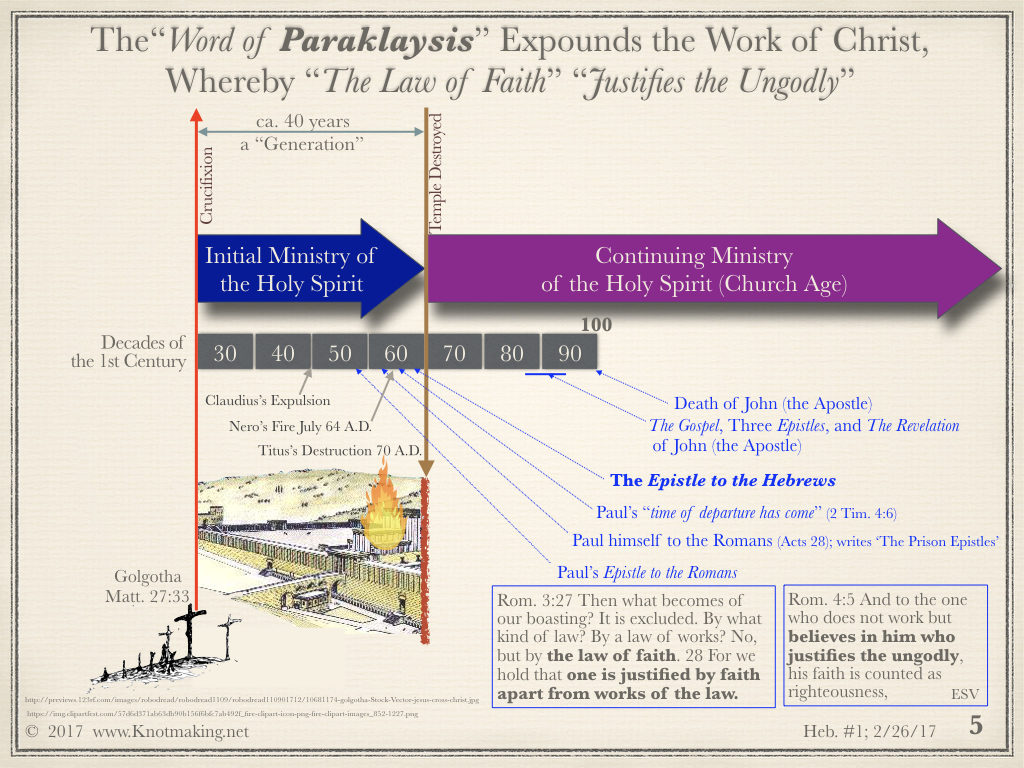
- Another possibility is that there was a highly localized, and unknown to history, persecution of Christians in Corinth to occur soon after the 1st Corinthian Epistle which Paul was given a sense of by a special revelation of the Holy Spirit. However, there is no Biblical evidence that such occurred which notice almost certainly would have been present given that a 2nd Epistle to Corinth was written with no such mention. Further, even if there was such a localized, Corinth-unique foretelling event why would this be in the Scriptures for our reading?
- The simplest answer, apparently, is that life for all of us is quite short, even in our day of advanced medicine with average life expectancies in the mid to late 70s and beyond. For those of us who are of that age, and so have. humanly-speaking, lived a long time, we all tend to feel “how quickly it has all gone by.” Every 10 years of life has 3,600 sunrises, so seven decades has about 25,000 of them. That seems like a huge number. But how quickly they go by, especially if one becomes distracted by the ways and things of this world. And of course no one is assured that even 70 or 80 years of sunrises will be one’s experience; many die young, and many who live into and even well past their 70s and 80s do so in an enfeebled condition even a state of dementia. So, if this is the explanation of Paul’s references (by the inspiration of the Holy Spirit) then the teaching is along the lines of “life is short” and John Piper’s book Don’t Waste Your Life. This makes even more sense when one considers that a Christian seriously living as such, perhaps as a traveling teacher or helper, they would have faced not only the hardships of travel but also literally deadly persecution as did Paul. Finally, we know from secular history that many, perhaps even a majority, of the people in the Roman Empire were slaves. Even Ch 7 makes clear that slaves were part of the church at Corinth. It would be expected that slaves might have a substantially shorter life, and one that could end or be dramatically altered on no notice.
- To aid us in keeping the complete text of 1 Corinthians in context, a summary of the major headings (known as “pericopes”) with certain key verses is given in the PDF here: 1 Corinthians Pericopes. In the overview page of 1 Corinthians there is a discussion of how such PDF was prepared.
- What common everyday word is missing in Ch 7 that you would expect to find prominently included in a chapter which is about marriage, sex, and virginity? “Love.” The word does not occur a single time in Ch 7. Below are all the occurrences (of all Gr forms of “love”) in 1 Cor.:
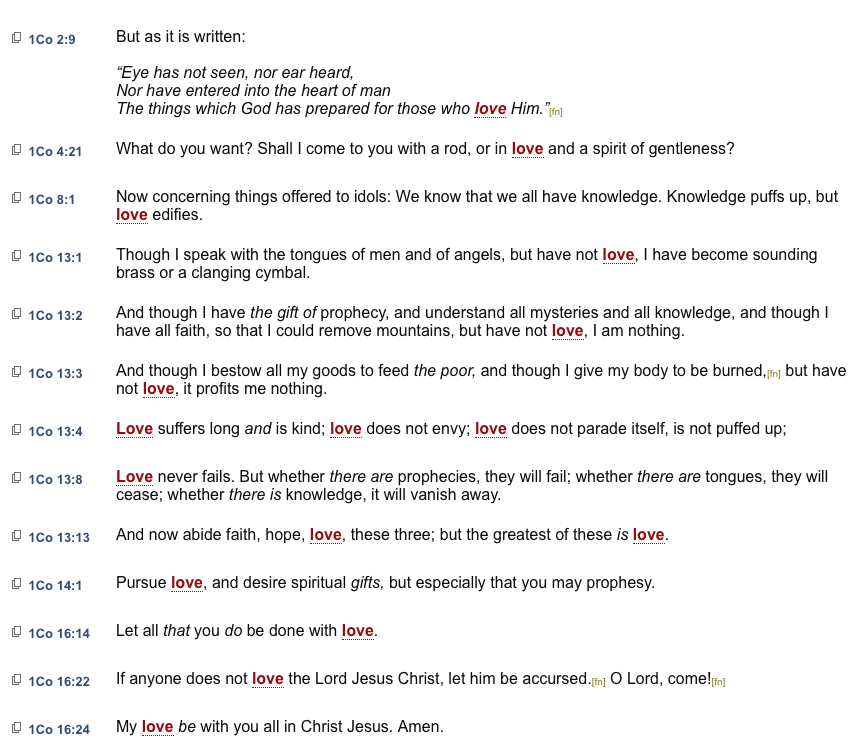
- This is doubly surprising as the most famous Biblical chapter on “love” and on quoted widely at weddings for both Christians and non, is 1 Cor 13 which, as evident above and from memory is all about “love.” However, as we will see, Ch 12 and Ch 14 are about the exercise of gifts of the Spirit. Accordingly, Ch 13 is almost surely about “gifts” as well. So the “love” of that Ch is not directed to marriage (however appropriate the counsel may be) but to the exercise of gifts in the service of the chaotic conditions in Corinth.
- Further of note, all the occurrence of “love” in 1 Cor, as shown in the above table, is the Gr agape love (Strongs G25, G26, G3588) except for a single occurrence at 1 Cor 16:22 where the Gr phyleo love (G5368, brotherly or friendship ‘love’) is used.
- All the occurrences of agape love in both Corinthian Epistles is pasted in below (none occurs in 1 Cor 7)
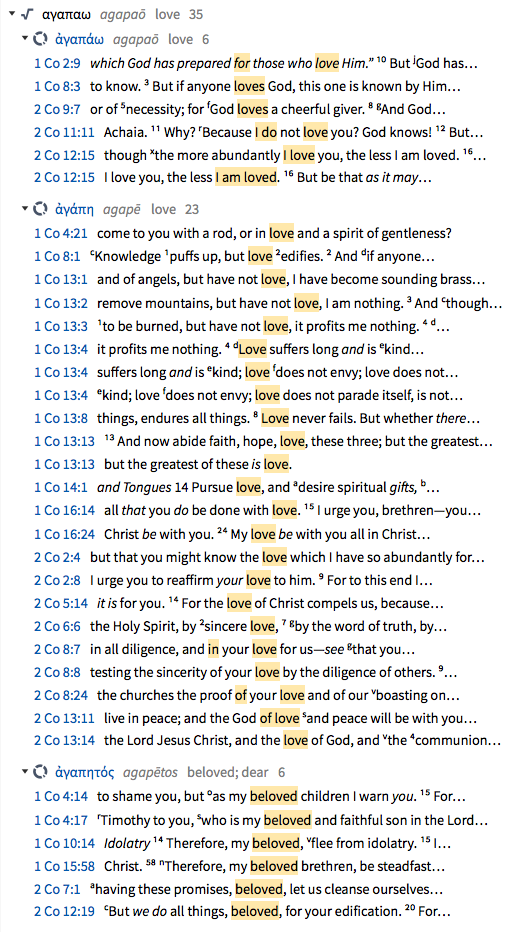
- All the occurrences of phileo love in both Corinthian Epistles is pasted below (none occurs in 1 Cor 7):
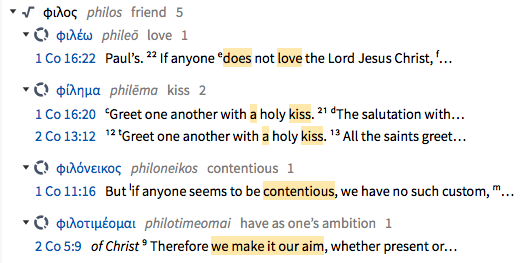
- Another word that expresses an inner sensation, a longing, relating to deep affection (non-erotic affection) is splanexia which literally means intestines (bowels), but never in a crude sense of the term. All the Corinthian occurrences is pasted in below:

- There are no occurrences for two other Gr words in Corinthians: storge (a family affection like a mother for a child), and eros (which never occurs in either the Gr NT or the Gr LXX [OT]).
- Here is a further analysis of “love” as it occurs in 1 Cor.: Love in NKJV in 1 Cor.
- Finally, here is a summary discussion of how the word “love” is used in the Bible, taken from McLean Bible, which adapted it from Precept Ministries: McLean Bible on Love
- “Love and Marriage” was a famous song in the previous Century, and we tend to think of them as highly connected ideas. However, the problem with “love” is that we usually are referring to the feelings associated with the word, and those can come and go, which perhaps is why marriage has become an institution that similarly seems to come and go. The statistics are terrible: about 50% of all marriages end in divorce and the data are about the same for so called “evangelical” (as a proxy term for ‘serious’) Christian couples as the secular world. More on this here.
- Yet there is another irony. Being married and staying married is claimed even by our kosmos as being the best predictor of prosperity. So failed marriages, or failure-to-marry (another dominant trend), can be seen as serious challenges to one’s future well-being however attractive the alternative to enduring marriage may seem at any given stage of life. In a sense, such marriage failures parallels the downside of being immersed in social media such as FB, namely: that one is very thinly ‘connected’ to some fake, electronic world instead of deeply connected to a close, meaningfully close, small, intimate network of real human beings.
1 Cor. Ch 8 is here:


